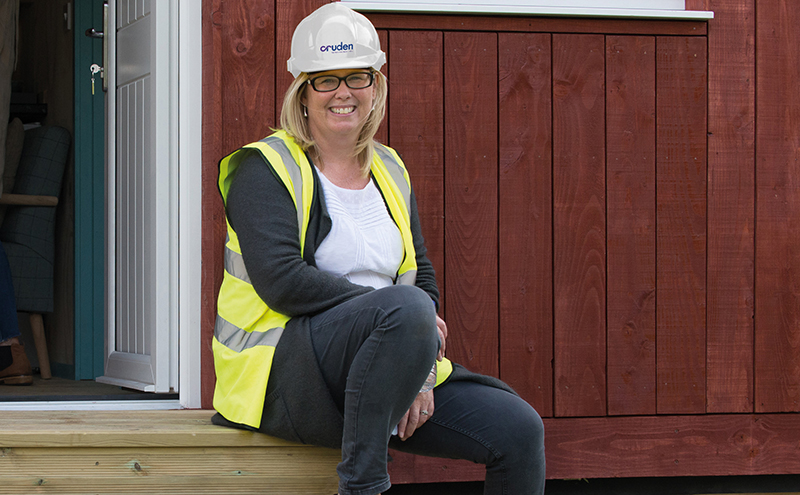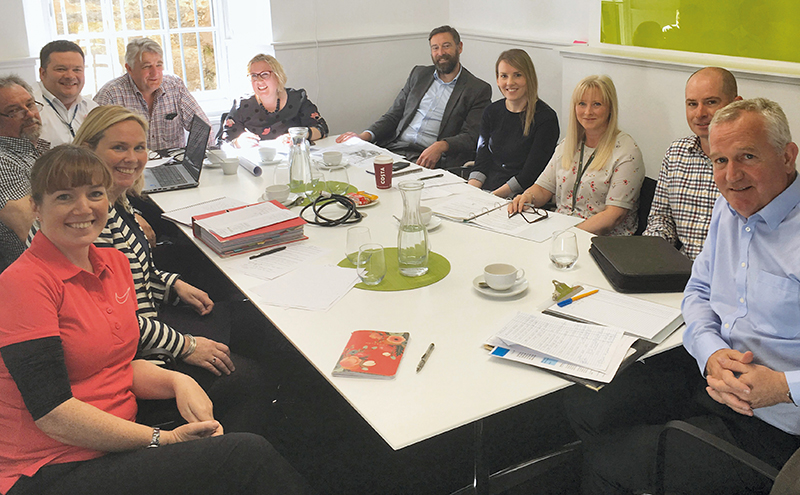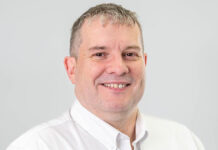
In February of this year, Gill Henry, head of business development at The Cruden Group, agreed to take on the role of project director for the Social Bite Village in Edinburgh. This exciting project is translating Social Bite’s co-founder, Josh Littlejohn’s vision to eradicate homelessness, into reality. Initially agreeing to work pro-bono one day a week, Gill’s task was to oversee the design, manufacture and on-site delivery of a new community in Granton. Inevitably, her role has grown exponentially as the project has developed and after several months of leading the technical team, she now takes this opportunity to explain some of the challenges and pressures of making this unique project actually happen.
FROM a standing start at the end of February this year, using contacts and relationships built up over many years by The Cruden Group, we assembled a multi-disciplined team without whom the project would simply not be where it is today.
Technical Team
• Gill Henry – The Cruden Group – project director
• Gill Cooke and Andy Nolan – Will Rudd – project engineers
• Mike Armstrong – Pottie Wilson – project cost consultant
• David Bell – Fouin & Bell – project architects
• Anthony Keenan – Peter Graham & Partners – principal designer
• James Culbertson and Kevin Keenan – Keenan Consultancy – project M&E advisors
• Tina Muldowney – Wardell Armstrong – project landscape architect
• Patrick Barry – Mason Evans – site investigation consultants
• Matt Stevenson – Carbon Dynamic – nest house manufacturer
• Jonathan Avery – Tiny House Scotland – nest house designer
• Bob Gould and Ronnie Bathgate – Robertson Group – groundworker
In addition, we are also very fortunate that the profile of this project allowed us to engage much more closely than normal with both Scottish Power and Scottish Water, who, along with utility contractor, Clancy Dowcra, have joined the technical team and are working collaboratively with us to make this all happen.
The team has worked tirelessly to finalise the design of the nest houses with Tiny House designer Jonathon Avery and Carbon Dynamic who are manufacturing the units; develop the site layout, develop and brief and design for the hub, develop the site works and cut and fill design to minimise costs and to secure all necessary consents.
Identifying a suitable principal contractor has also been challenging as we are benefiing from so many free services and materials which the principal/main contractor will be required to co-ordinate. Luckily we have the knowledge and experience of Mike Armstrong assisting in contractual arrangements which are slightly less standard than normal contracts.
Co-ordinating all of the above, in parallel with structuring legal agreements for the site with landowner EDI, finalising the necessary contracts for the various work packages and managing the site utilities to ensure the project is deliverable, has required a significant amount of resource, commitment and leadership from The Cruden Group.
The proposed site is currently overgrown, self seeded and has a significant slope from top to bottom. It is also a well used through route for both pedestrians and cyclists.
Because the village is temporary, it has been really important to minimise the cost of the infra-structure. We also have to obtain a caravan licence to allow Social Bite to occupy the village.
Working under caravan legislation, we don’t need a building warrant for the structures, just the drainage, which has significantly helped us to achieve the end date for completion.
Led by Gill Cooke, the project engineers Will Rudd worked closely with Mason Evans to identify how best to deal with the ground conditions in a manner that would produce a robust solution on a temporary basis whilst still meeting all the legislative requirements.
The units themselves are very light, so the groundworks strategy involves scraping back the site, carrying out an extensive cut and fill exercise to platform the site for the units to sit on. The excess material will be stored on site in a mound so we don’t have to take anything off site, which helps keep the site works cost as low as possible. The point loads of each unit are such that standard foundations are not required, just a layer of hardcore.

Thanks to Jen Knighton and her team at Scottish Water, the drainage and water consents have been in place for some time, well in advance of the planning consent being issued which is testament to the efforts Scottish Water have made to enable the project to start on site as early as possible. Equally, Deborah Philips and her team at Scottish Power have also played a significant role in co-ordination and delivery of multi utilities on site with sub-contractor Clancy Dowcra.
The project is gathering significant momentum now. We are currently finalising a Heads of Terms with EDI for the site and the plan is to now to get the project complete for the end of January 2018 – which is slightly later than originally planned but still only 10 months in total.
We are aiming to demonstrate how this very innovative project can be delivered and then potentially rolled out on a more commercial basis.
Josh Littlejohn is extremely persuasive, very talented in mustering support and clear on his vision. With the assistance of Josh and Tony Hackney of BSW the team have collectively managed to procure as many services and materials free gratis as we can with the project benefiting from huge assistance from a wide variety of organisations and individuals.
Josh’s unerring determination and total inability to understand the word ‘no’ has created many challenges along the way for the technical team.
At times trying to translate his vision into practical reality within an extremely challenging programme has been both frustrating and stimulating in equal measures.
Every project management bone in my body shouts ‘NO NO NO’ on a daily basis, as the sequence and approach we are taking to actually make Josh’s vision happen goes against everything I would normally do in terms of managing a project and the risk associated with it.
However, with this in mind we have been able to work, freed from the normal shackles and look at how to do things better, quicker and more innovatively. It has demanded true partnership working and collaboration which I feel is one of the best outcomes of the project so far.
With everyone so supportive of the vision, we are all working outwith our normal comfort zones to make the project happen.
At time of writing, we are now in week 29 of the project and if I am being honest, I really did not think we would be at this stage so quickly when we didn’t even have a site, brief or design at the beginning of March.
The Carbon Dynamic team is also worth a serious mention. They have been utterly fantastic in terms of driving the project forward and having a prototype ready for St Andrews Square during the festival.
I was involved in installing the prototype on St Andrews Square which was quite possibly one of the most stressful days of my career. We arrived on site just after 5.30am to find two low loaders provided by Ferguson Transport containing the prototype and two forklifts.
With tremendous assistance from Grant Stewart of Essential Edinburgh, the Carbon Dynamic team somehow managed to unload the house just as rush hour started and manoeuvre it over the gates, between the trees into position – which took almost six hours, the last hour or so under the watchful eye of the Scottish media!
We then spent 12 hours from 3pm in the afternoon to 3am in the morning on 1st September, removing it from St Andrews Square on a busy Friday night and moving it out to and installing it at Edinburgh Airport, which involved a large crane once we got to the airport.
These aren’t normally the types of activity I would be involved in, but given the profile of the project and the amazing commitment shown by all the partners I am lucky enough to be working with, I felt it was important to assist and lead these moves to ensure the team understands their valuable contributions are genuinely appreciated, which for me, is a big part of being the project director especially when most parties are all working on this for no commercial return.
I have no doubt that this project will be delivered. Whether I will be sane and not an alcoholic at the end of it remains to be seen! However, despite the complexities and frustrations, I am thrilled to be leading the project and to be working with such a fabulous team on what I believe is a particularly important project which will change the way homelessness is managed in Scotland.
I would also like to thank The Cruden Group who have been fantastically supportive in allowing me time to service the project to a significantly greater extent than any of us ever envisaged at the outset.
The Group will also be participating in the “Sleep in the Park” event on 9th December.








